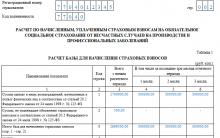Financial management is carried out through the use of appropriate management apparatus. General management carry out finances higher authorities power and administration: the President of the Russian Federation and his Administration, the Federal Assembly, the Government of the Russian Federation.
President of the Russian Federation(Administration of the President of the Russian Federation) regulates the activities of financial bodies, has the right to veto financial legislation, signs federal law on the federal budget of Russia, prepares and sends the Budget Message to the Federal Assembly.
Federal Assembly approves financial laws, reviews the project federal budget Russia and approves the law on the federal budget.
Government of the Russian Federation forms the federal budget, is single center financial management, develops conceptual framework financial policy.
The main body implementing current management public finances, is Ministry of Finance Russian Federation.
Main task Ministry of Finance of the Russian Federation - development of a unified state financial, credit, monetary policy, as well as audit policies, accounting And financial statements, mining, production, processing of precious stones, customs duties, including the determination of customs duties on goods and vehicles. To fulfill its tasks, the Ministry carries out the following main Features:– development of a draft federal budget and forecast consolidated budget Russian Federation;
– forecasting and cash planning for the execution and execution of the federal budget, drawing up a report on the execution of the federal budget and the consolidated budget of the Russian Federation;
– financial control and supervision in the financial and budgetary sphere;
– improvement of budget planning methods and procedures budget financing, methodological guidance in this area, as well as in the field of drawing up and executing the federal budget;
– management of state internal and external debt of the Russian Federation;
– carrying out the functions of an issuer of government securities Russian Federation;
– coordination of budgetary and monetary policy in accordance with macroeconomic policy objectives.
An independent legal entity that is part of the Ministry of Finance of the Russian Federation is Federal Treasury.
The structure of the Federal Treasury includes the Main Directorate of the Federal Treasury, territorial bodies in the constituent entities of the Russian Federation, and Federal Treasury bodies in districts, cities and urban areas. When controlling all receipts and payments cash budgets and off-budget funds within the structure of the executive branch, the Treasury carries out the functions of a cashier and chief accountant. The information received from the Treasury allows the leadership of the Ministry of Finance of the Russian Federation and the Government of the Russian Federation to objectively assess the work of government bodies and optimize the distribution of budget flows among ministries and departments.
Management is understood as an element, a function of organized systems of various natures, ensuring the preservation of their specific structure, maintaining the mode of activity, and the implementation of their programs and goals. In the financial and credit encyclopedic dictionary, financial management is interpreted as “the conscious influence of government bodies on the finances of the country, regions, economic entities and on financial processes, financial activities, carried out with the aim of achieving and maintaining balance, financial stability economy, income generation, profit, financial security of solved economic and social problems.”
In a financial management system, as in another managed system, there is an object and a subject of management. Control objects are groups financial relations, and the subjects are financial management bodies. Objects of financial management can also include relationships between business entities regarding the distribution of income (joint funds, equity participation, penalties, etc.; the relationship between insurance organizations, on the one hand, and business entities and the population, on the other hand, regarding the formation and use of insurance funds; relationships between business entities and higher-level organizations regarding the formation and distribution of funds created by the higher-level organization; relationships within enterprises, institutions, organizations for the distribution of revenue, the formation of cash income, savings, funds of funds and their use. Financial management objects can also be classified by links financial system Russian Federation. On this basis, the following objects of financial management should be distinguished: public finances, finances of business entities and local finances.
The subjects of financial management are legislative and executive bodies authorities and management in accordance with their competence in financial sector. It is legitimate to classify them according to the links of the financial system. Thus, the current management of public finances is carried out by the Ministry of Finance of the Russian Federation and its territorial bodies. Local finance management is carried out by the financial authorities of municipalities. Large business entities create specialized financial management bodies (finance departments, financial management or departments); in small organizations, financial management functions are included in job responsibilities economists, mainly chief accountants.
The functions of financial management should include financial planning and forecasting, financial analysis, financial control, accounting financial resources and other funds, as well as based on the use of all these functions, financial regulation.
Financial management is carried out through the use of appropriate management apparatus. General financial management is carried out by the highest authorities and management: the President of the Russian Federation and his Administration, the Federal Assembly of the Russian Federation, the Government of the Russian Federation.
The main body carrying out the current management of public finances is the Ministry of Finance of the Russian Federation.
The leadership of the Ministry of Finance of the Russian Federation is carried out by the Minister of Finance and his deputies. Before the entry into force of Decree of the President of the Russian Federation of March 9, 2004 No. 314 “On the system and structure of federal executive bodies,” the Minister of Finance of the Russian Federation had five first deputies, including one secretary of state, and seven deputies. The organizational structure of the Russian Ministry of Finance included 28 structural divisions. Specialized functions for financial management were carried out by the following divisions of the Ministry of Finance: Department of Budget Policy, Main Directorate of the Federal Treasury, Department tax policy, Department of State Internal Debt Management, Department of Industry Finance, Department of Budget Loans and Guarantees, Department of State financial control, Department of Interbudgetary Relations, etc.
In accordance with the Regulations “On the Ministry of Finance of the Russian Federation”, approved by Decree of the Government of the Russian Federation of June 30, 2004 No. 329, the Ministry of Finance of the Russian Federation is federal body executive power, carrying out the functions of developing public policy and legal regulation in the field of budgetary, tax, insurance, currency, banking, public debt, auditing, accounting and financial reporting, production, processing and circulation precious metals and precious stones, customs duties, including determination of the customs value of goods and vehicles, investing funds to finance the funded part of a labor pension, organizing and conducting lotteries, production and circulation of security printing products, financial support civil service, combating the legalization of proceeds from crime and the financing of terrorism.
The main task of the Ministry of Finance of the Russian Federation is to develop a unified state financial (including budgetary, tax, insurance, foreign exchange, public debt), credit, monetary policy, as well as policies in the field of auditing, accounting and financial reporting, mining, production, processing precious metals and precious stones, customs duties (in terms of calculation and payment procedure), including determination of the customs value of goods and vehicles. To fulfill its tasks, the Ministry carries out the following main functions:
Development of a draft federal budget and a forecast of the consolidated budget of the Russian Federation;
Forecasting and cash planning for the execution and execution of the federal budget, drawing up a report on the execution of the federal budget and the consolidated budget of the Russian Federation;
Implementation of financial control and supervision in the financial and budgetary sphere;
Improving methods of budget planning and the procedure for budget financing, providing methodological guidance in this area, as well as in the area of drawing up and executing the federal budget;
Management of state internal and external debt of the Russian Federation;
Functions of the issuer of government securities of the Russian Federation;
Coordination of fiscal and monetary policies in accordance with macroeconomic policy objectives;
Other functions.
An independent legal entity that is part of the Ministry of Finance of the Russian Federation is the Federal Treasury of the Ministry of Finance of the Russian Federation. Treasury bodies first appeared in Russia in 1863, when the State Treasury Department was formed within the Ministry of Finance, which is the executive body that collects government revenues, their storage and transfer of funds from the district to the provincial treasury or to the State Bank. In Soviet Russia, after the revolution of 1917, the Treasury bodies were abolished and created again only in 1992. The goals of creating the Treasury were the effective management of income and expenses in the process of executing the republican (later - federal) budget of the Russian Federation, increasing efficiency in financing government programs, strengthening control over the receipt, targeted and economical use of public funds.
The structure of the Federal Treasury includes the Main Directorate of the Federal Treasury of the Ministry of Finance of the Russian Federation, Territorial bodies in the constituent entities of the Russian Federation, and Federal Treasury bodies in districts, cities and urban areas. Treasury bodies perform the following tasks:
Carry out cash management in treasury accounts, preliminary and current control of intended use budget funds;
Compile a short-term forecast of the volume of federal budget resources;
Collect, process and analyze information about the status public finance for public authorities and management;
Prepare reports on financial transactions according to the appropriate budget;
Develop methodological and instructional materials for the implementation of the relevant budget.
To carry out these tasks, the Federal Treasury authorities:
Carry out cash execution of the federal budget and management of funds located in the relevant accounts in the banking system, cash service budgets of the constituent entities of the Russian Federation and local budgets, distribution of income between budgets of various levels;
Maintain a consolidated register of managers and recipients of federal budget funds, accounting for operations on the movement of federal budget funds, collecting, processing and analyzing information and reporting;
Carry out short-term forecasting of income and cash planning of federal budget expenditures.
When monitoring all receipts and payments of funds from budgets and extra-budgetary funds in the structure of the executive branch, the treasury performs the functions of a cashier and chief accountant. The information received from the Treasury allows the leadership of the Ministry of Finance and the Government of the Russian Federation to objectively assess the work of government bodies and optimize the distribution of budget flows among ministries and departments.
The financial system of the Russian Federation is the spheres and links of financial relations and the financial management bodies associated with them in the Russian Federation.
Management financial activities are subject to the goals and objectives of financial policy, financial and related legislation. State authorities and local governments participate in management.
Financial management: subjects and objects
Subjects of financial management – a set organizational structures who directly exercise control. According to the structure of the financial system of the Russian Federation, there are different types of management objects:
— management of state and municipal finances, finances of constituent entities of the Russian Federation;
— financial management of business entities (finance of enterprises and organizations, finance autonomous institutions and public funds, finance individual entrepreneurs operating without registration of a legal entity).
Elements of financial management is management
— budgets;
— off-budget funds;
— insurance;
- financial and credit institutions.
Subjects of management:
— legislative bodies (adopt laws on finance and financial activities);
— executive bodies of financial management in the Russian Federation (direct, regulate and control financial processes);
- financial apparatus of commercial and non-profit organizations, enterprises and institutions.
Financial management bodies in the Russian Federation
At the national level, financial management is carried out by
1) President of the Russian Federation.
Function – budget message (message about internal and foreign policy state, formulation of the basic principles of financial policy for a certain period).
2) Parliament ( State Duma, Federation Council).
— adoption of federal laws;
— approval of the federal budget and control over its implementation.
3) Government of the Russian Federation.
The task is to develop the federal budget, budgets of state and extra-budgetary funds.
4) Ministry of Finance of the Russian Federation.
The task is to implement financial policy.
5) Federal Tax Service.
Monitors the correctness of calculation and payment of taxes to the budget.
6) Federal Customs Service.
Controls the calculation and payment of customs duties.
Along with the Federal Treasury, it carries out cash execution of the budget. Responsible for the formation of monetary policy.
8) Accounts Chamber of the Russian Federation. 
Controls the spending of federal funds in accordance with financial legislation.
Thus, the legislative and executive authorities carry out strategic activities.
Ministries, federal services and agencies are responsible for operational management. Regional and local financial management bodies in the Russian Federation are subordinate to the national ones.
The impact of the work of regulatory authorities on the economy
Public financial management in all countries only partly determines development market economy, however, this part is always quite significant. It includes:
Definition priority areas activities in the state. The ability to regulate this area is provided by the stimulating function of finance, thanks to which, when making certain decisions at the state level, it is partly possible to form a local market.
Establishment and further control of operating rules in the domestic market, including legislative framework, priority areas, tax pressure.
Ensuring budgetary areas of the state’s work: education, medicine and others.
The stability of the exchange rate is national currency.
Ensuring and monitoring the operation of enterprises in strategically important industries.
Formation and management of the state budget.
Sustainability banking system internal due to the control of the national bank.
Suppression of economic crimes at all levels.
Analysis of economic development, providing citizens with detailed monitoring data of various economic sectors.
There are areas in which influence government agencies a few below, among them:
Courses on . Here, foreign policy factors for the state will play an important role, and only in some cases can it take control over foreign exchange market manually. This usually happens during periods of crisis.
Development of private banks and credit institutions(in the normal state of a market economy).
Activities of international corporations and funds, especially those registered in other states.
Operation of enterprises operating outside strategically important areas.
Section 1. Concept of finances and their management.
1. The concept of financial management.
2. Financial management bodies and their functions.
3. Financial planning and forecasting.
Financial management- is a system of forms, methods and techniques by which management is carried out money turnover and financial resources.
The objects of financial management are different types of financial relations. Objects of financial management can be classified according to the links of the financial system of the Russian Federation. On this basis, the following objects of financial management should be distinguished: public finances, finances of business entities and local finances.
The subjects of financial management are the legislative and executive authorities and management in accordance with their competence in the financial sector. It is legitimate to classify them according to the links of the financial system.
The purpose of financial management is to ensure sustainability and financial independence, manifested in macroeconomic balance, budget surplus, reduction of public debt, the strength of the national currency, and ultimately in the growth of the well-being of the population.
In the process of financial management, management bodies perform the following functions: financial planning, operational financial management, financial control.
The influence of the subject on the object of management can be carried out using both administrative and administrative and economic methods of management. Both methods are used in both command-administrative and market economies. Administrative and administrative methods involve the development of orders, instructions, and other administrative documents, their communication to subordinates and monitoring their implementation. Economic methods based on the material interest of personnel in increasing the efficiency of performing their functions.
Financial management on modern stage unthinkable without automated system management (ACS-finance).
Financial management is carried out through the use of appropriate management apparatus. General financial management is carried out by the highest authorities and management: the President of the Russian Federation and his Administration, the Federal Assembly, the Government of the Russian Federation.
The President of the Russian Federation (Administration of the President of the Russian Federation) regulates the activities of financial bodies, has the right to veto financial legislation, signs the federal law on the federal budget of Russia, prepares and sends the Budget Address to the Federal Assembly.
The Federal Assembly approves financial laws, considers the draft federal budget of Russia and approves the law on the federal budget.
The Government of the Russian Federation forms the federal budget, is a single center for financial management, and develops the conceptual framework of financial policy.
The main body carrying out the current management of public finances is the Ministry of Finance of the Russian Federation.
In accordance with the Regulations on the Ministry of Finance of the Russian Federation, approved by Decree of the Government of the Russian Federation of June 30, 2004 No. 329, the Ministry of Finance of the Russian Federation is a federal executive body that carries out the functions of developing state policy and legal regulation in the field of budgetary, tax, insurance, foreign exchange, banking, public debt, auditing, accounting and financial reporting, production, processing and circulation of precious metals and precious stones, customs duties, including determination of the customs value of goods and vehicles, investing funds to finance the funded part of the labor pension , organization and conduct of lotteries, production and circulation of security printed products, financial support of the public service, anti-money laundering and the financing of terrorism.
The leadership of the Ministry of Finance of the Russian Federation is carried out by the Minister of Finance and his deputies. The Minister of Finance of the Russian Federation has five deputies, including one secretary of state.
The Ministry of Finance of the Russian Federation has the following structure:
1) Central office of the Ministry of Finance of the Russian Federation;
2) Federal Tax Service;
3) Federal Service for Financial and Budgetary Supervision;
4) Federal Insurance Supervision Service;
5) Federal Treasury.
An independent legal entity that is part of the Ministry of Finance of the Russian Federation is the Federal Treasury. The structure of the Federal Treasury includes the Main Directorate of the Federal Treasury, territorial bodies in the constituent entities of the Russian Federation, and federal treasury bodies in districts, cities and urban areas.
When monitoring all receipts and payments of funds from budgets and extra-budgetary funds in the structure of the executive branch, the treasury performs the functions of a cashier and chief accountant.
The Federal Tax Service and the Federal Customs Service exercise control over the correctness of calculation, completeness and timely payment of taxes, customs revenues, fees and other payments to budget funds. Federal agency for the management of federal property organizes the management of state property in order to obtain non-tax income. Federal Service for financial markets controls the activities of participants stock market, thereby helping to increase revenues to the budget fund.
The Bank of Russia system is an important body for the implementation of monetary and financial policies. The Bank of Russia, along with the Federal Treasury, carries out budget execution and controls the activities of other credit institutions.
The Accounts Chamber of the Russian Federation controls the implementation of financial legislation and the movement of federal funds. It is independent from the Government of the Russian Federation and is accountable to the Federal Assembly of the Russian Federation.
Carrying out financial policy in the constituent entities of the Russian Federation, their administrative-territorial and municipalities carried out by relevant financial institutions.
Territorial financial bodies are functional divisions of territorial administrations, but at the same time they are part of the system of the Ministry of Finance of the Russian Federation. Territorial financial authorities ensure the development and implementation of a unified financial policy of territorial administrations, the preparation and execution of the territorial budget, and executive and administrative functions in the field of financial management of the territory.
Territorial authorities Federal tax service are the tax inspectorates for the relevant territory (republic, territory, region, city, district). District, city, and state tax inspectorates carry out the main burden of direct monitoring of implementation tax legislation all physical and legal entities in the serviced area. Structure of district, city tax office approved on the basis of socio-demographic, economic and geographical characteristics district, city, volume of work performed and other factors taken into account when creating internal divisions.
The main object of financial planning is financial resources redistributed between individual entities of the financial system. The movement of financial resources is fixed in the relevant plans that form unified system financial planning. Central place in the system financial plans belongs budgets(federal, subjects of the Federation, local governments).
Budgets are developed taking into account the need to achieve minimum state standards based on financial cost standards, as well as in accordance with other norms (standards) established by the legislation of the Russian Federation, constituent entities of the Federation, legal acts local government bodies.
Along with budgets at the federal level, the level of constituent entities of the Federation, and local governments, extra-budgetary funds can and are being formed. Cash flows in these funds are reflected accordingly in income and expense estimates.
At the national and territorial levels, the financial planning system includes the development and implementation of long-term financial plans, financial balances, as well as balances of income and expenses of the population.
For financial planning, information that gives an idea of the state of affairs in the future, i.e., predictive information, is of particular importance. The process of obtaining this information is called forecasting.
Financial forecasting is the substantiation of financial plan indicators, foresight financial situation for a given period of time. In theory and practice, there are medium-term (5-10 years) and long-term (more than 10 years) financial forecasting.
The main goal financial forecasting is the determination of the realistically possible volume of financial resources and their needs in the forecast period. Financial forecasts are a necessary element and at the same time a stage in the development of financial policy. They make it possible to develop various scenarios for solving socio-economic problems facing all subjects of the financial system.
Various forecasting methods are used in theory and practice. Among them we highlight the following:
Methods of expert assessments (survey using the Delphi method, representative survey, etc.);
Methods for processing spatial and temporal aggregates;
Methods of situational analysis and forecasting, including simulation methods, growth models;
Methods of proportional dependencies of indicators, including production functions and cost functions.
1. What is meant by financial management?
2. What financial management bodies exist in the Russian Federation at the federal, regional and local levels?
3. What financial plans and forecasts are developed as part of financial management?
Financial management is carried out through the use of appropriate management apparatus. General financial management is carried out by the highest authorities and management: the President of the Russian Federation and his Administration, the Federal Assembly, the Government of the Russian Federation.
The President of the Russian Federation (Administration of the President of the Russian Federation) regulates the activities of financial bodies, has the right to veto financial legislation, signs the federal law on the federal budget of Russia, prepares and sends the Budget Message to the Federal Assembly.
The Federal Assembly approves financial laws, considers the draft federal budget of Russia and approves the law on the federal budget.
The Government of the Russian Federation forms the federal budget, is a single center for financial management, and develops the conceptual framework of financial policy.
The main body carrying out the current management of public finances is the Ministry of Finance of the Russian Federation.
The main task of the Ministry of Finance of the Russian Federation is to develop a unified state financial, credit, monetary policy, as well as a policy of auditing, accounting and financial reporting, mining, production, processing of precious metals and precious stones, customs duties, including the definition customs goods and vehicles. To fulfill its tasks, the Ministry carries out the following main functions:
– development of a draft federal budget and a forecast of the consolidated budget of the Russian Federation; – forecasting and cash planning for the execution and execution of the federal budget, drawing up a report on the execution of the federal budget and the consolidated budget of the Russian Federation; – financial control and supervision in the financial and budgetary sphere; – improvement of budget planning methods and budget financing procedures, methodological guidance in this area, as well as in the field of drawing up and executing the federal budget; – management of state internal and external debt of the Russian Federation; – implementation of the functions of the issuer of government securities of the Russian Federation; – coordination of fiscal and monetary policies in accordance with macroeconomic policy objectives.
An integral part of the financial management process is financial control. In the Russian Federation at the federal level, state financial control bodies are represented by the Accounts Chamber, the Main Directorate of the Federal Treasury and its bodies in the constituent entities of the Russian Federation, the Department of State Financial Control and Audit, the Control and Audit Directorate of the Ministry of Finance of Russia, as well as the Ministry of Taxes and Duties of the Russian Federation, Central Bank Russian Federation, State Customs Committee of the Russian Federation, Federal service of Russia for the supervision of insurance activities, the Federal Service for Financial Monitoring, the Federal Service for Financial Markets, the Federal Service for Financial and Budgetary Supervision.
FINANCIAL PLANNING AND FORECASTING
Financial planning is an activity to achieve balance and proportionality of financial resources. Balance means the optimal ratio between the financial resources at the disposal of the state and the income remaining with business entities. Proportionality is a rational relationship between the amount of income before payment of tax and its amount after payment for enterprises, sectors of the economy, regions, and constituent entities of the Russian Federation. By increasing or decreasing this ratio, the state can stimulate or limit their development. Financial planning is an integral part of economic planning.
The movement of financial resources is reflected in the corresponding financial plans, consisting of income and expenditure parts. Balances of financial resources (financial balances) play an important role in ensuring proportionality and balance in economic development. The financial balance sheet is a summary of all income and expenses of the budget and state extra-budgetary funds; it also includes the profit of organizations remaining at their disposal and depreciation. The financial balance is built on the basis of comparing income with expenses. The excess of expenses over income (income over expenses) determines the deficit (surplus) financial balance.
The financial balance is the main analytical tool when designing the budget of the Russian Federation and forecasting sources capital investments, formed on the territory of a constituent entity of the Russian Federation. It is prepared on the basis of the reported financial balance for the previous year, expected in this year results and main parameters of the forecast of socio-economic development of the Russian Federation.
The most important part of financial planning is budget planning. In the process of budget planning, the directions for the distribution and redistribution of budget resources are determined in accordance with the goals and objectives set in the Budget Address of the President of the Russian Federation and specified in budget policy. As part of financial planning, budget planning is one of the most important tools for regulating the economy and is subject to the requirements of the state's financial policy.
Financial forecasting is understood as foreseeing the possible financial situation of the state and justifying long-term indicators of financial plans. Financial forecasting precedes financial planning and is based on the concept of developing the country's financial policy for the medium and long term. The purpose of financial forecasting is to determine the realistically possible volume of financial resources, sources of formation and their use for the long term. Financial forecasts allow you to outline and analyze different options financial support for the development of the country and its regions, forms and methods of implementing financial policy.
Financial forecasting involves the use of various methods: the construction of econometric models that describe the dynamics of financial plan indicators depending on the factors determining economic processes; correlation-regression analysis; method of direct expert assessment.











Carrying out an inventory
Ulyukaev, Navka and Patrushev
Income tax refund for treatment: registration procedure and calculation of the deduction amount
Import substitution - what is it?
OSAGO minimum insurance period